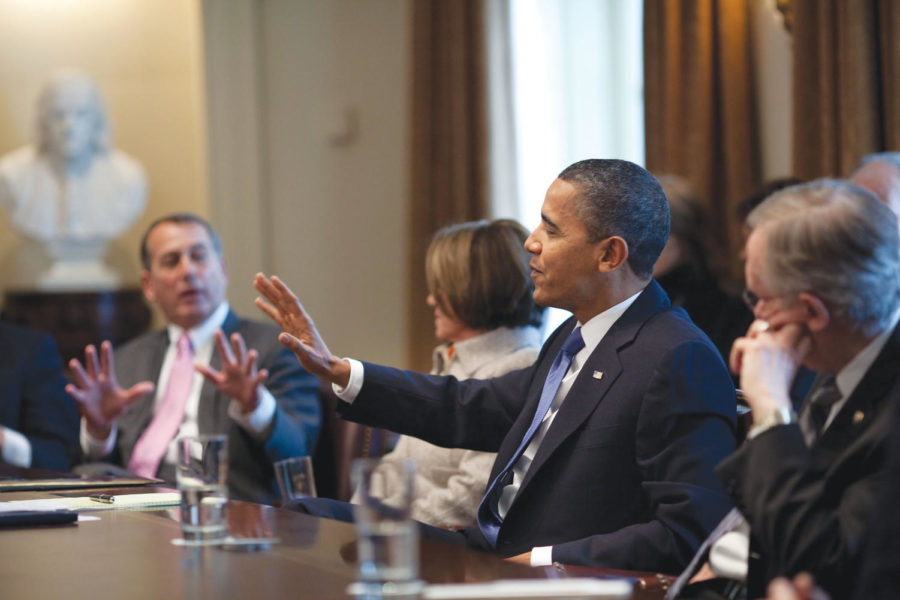Vriezen: Budget talks in Washington are getting nowhere
During a spirited bipartisan Congressional leadership meeting, both the President and John Boehner, the House Speaker, talk at the same time.
July 28, 2011
Once again, Washington is is entangled in a mess of budget negotiations, arguments and stonewalling. We are yet again approaching a deadline ⎯ come Aug. 2, the United States of America will default on its $14.3 trillion debt, unless some course of action is agreed upon in Congress in the coming days.
The fight is not particularly new. Republican representatives want to cut spending and programs while the Democrats hope for legislation that includes tax hikes. Yet once again, the problem seems to be the lack of compromise as to what is an appropriate solution to this situation. Can we get by with simply cutting government programs and reducing spending? Will tax increases for the wealthy do us any good?
Clearly, neither will solve the problem. Cutting spending will limit government programs or eliminate them. Many American families rely on government programs for a variety of services. Raising taxes for the top income bracket in the US will raise revenue, but will not solve the bigger issue. There will still need to be a hard look at US spending and an effort must be made to streamline costs.
According to a CNN/ORC International Poll, 64 percent of those that responded in mid-July favored a compromise that included spending cuts as well as tax increases. Less than 35 percent voted for a budget plan based only on limiting government spending.
Of course, no one is particularly fond of tax increases. But the tax increases that President Obama favors apply to those that earn an excess of $250,000 a year. This income bracket of Americans constitutes about 2 percent of the population.
I find it hard to object to raising taxes for a very small portion of the population: the richest. At the very least, when the other option is to cut even more money from government programs, likely at the expense of those that need them, raising taxes doesn’t seem horribly unreasonable.
Yet, unsurprisingly, members of the Republican party staunchly oppose any sort of plan that includes raising taxes. Though while Obama would probably still like to see a deal with some tax increases, Senate Majority Leader Harry Reid, D-Nevada, proposes a solution that is free of tax hikes.
Reid’s plan will cut $2.7 trillion in spending over the next 10 years, and raise the debt ceiling by $2.4 trillion. This will give the government until after the 2012 elections. The debt ceiling will then become an issue once more. Additionally, a committee would be formed of House and Senate members to explore other ways of reducing national debt.
The competing Republican proposal from House Speaker John Boehner would cut $1.2 trillion in spending over the next 10 years, and raise the debt ceiling enough to last the government through 2011. A later vote in Congress would raise the debt ceiling further, as long as Congress approved tax reforms and changes to entitlement programs set out by a committee of House and Senate legislators.
The immediately visible problem here is that Boehner’s proposal pushes the debt ceiling back only slightly, and it looks like Congress will simply face more haggling and stalemates in a few months.
With the recent government shutdown in Minnesota and now the national budget problems America faces, I have increasingly lost faith in the possibility of civil political debate. It seems that every time there is an argument over how to proceed with governmental reforms or changes, party lines are drawn and battle axes are sharpened.
I am a fan of compromise. It’s a useful tool for living realistically. Sometimes compromise is essential for any progress to be made or for anything worthwhile to come of an argument. It’s up to the politicians in Washington to work beyond party differences and perhaps attempt to solve the issue at hand before the United States defaults.

















